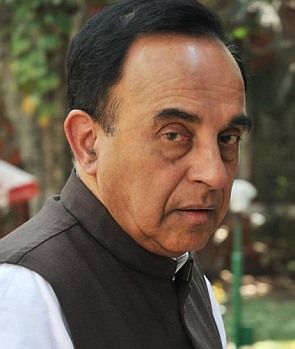 The Bharatiya Janata Party government is following Congress' "outdated" China policy, senior party leader Subramanian Swamy said as he termed Beijing's backing to Pakistan in the United Nations on the Mumbai terror attack mastermind Zaki-ur Rehman Lakhvi as a "wake up call".
The Bharatiya Janata Party government is following Congress' "outdated" China policy, senior party leader Subramanian Swamy said as he termed Beijing's backing to Pakistan in the United Nations on the Mumbai terror attack mastermind Zaki-ur Rehman Lakhvi as a "wake up call".
Swamy said Prime Minister Narendra Modi should convene a conference of "insiders" to draw up a new policy especially after the recent Lakhvi episode.
"We are working on Congress party's outdated China policy. The Prime Minister needs to convene a conference of insiders to draw up a new China policy which should review our strength, weaknesses and opportunities," Swamy, senior member of the BJP's national executive, told the Indian media.
The present China policy lacks clarity, he said, adding: "We have a China policy but it is carry over."
Swamy, here to attend 2015 World Peace Forum conference organised by China's TsinghuaUniversity, said China's backing to Pakistan on Lakhvi should be a "wake up call".
"I have been informed that they (China) had hinted to our people that a vote in the UN against Pakistan is premature and we did not read the signal," he said.
“For China, abandoning Pakistan means empowering India. You have to empower yourself. Why should they make the road clear?" he said.
On the impact of Chinese President Xi Jinping's visit to India and Modi's visit here last month, Swamy said not much progress has been added except commitment of about $20 billion, mostly from Chinese private sector.
"We should not be carried away by atmospherics. Every visit (of Modi) is described as historic. We have not seen anything from Japan. My advice to Modi: convene a conference with people who know China, whomsoever you are comfortable with and devise a new China policy," he said.
He also said Indian navy's strength both in fleet and weapons should be vastly increased to the point that it can be deployed to police on busy shipping routes like Malacca Strait in cooperation with Indonesia which could be an "effective answer" to China's plans of 'String of Pearls' to contain India.
Swamy said India's new China policy should have a clear statement on what will be our stance on issues like in the event of China-US conflict.
"Chinese will find it acceptable to have neutrality. If it becomes public, Americans tolerate that. The China policy should have clarity. We have a China policy but it is carry over," he said.
"At the moment, there are issues between India and China that require urgent resolution. Border will be a by-product solution. Border cannot be one of the solutions," he said.
About China, he said Beijing understands India's potentiality.
"They understand that the world does not put us in the same measure as China. They recognise our potentialities and our strategic positioning in the Indian Ocean. But at the same time till India builds strength in commensurate with its potentialities, the question of negotiating an equal status with China will not happen," he said.
In order to be effective, India should make it clear that it will remain neutral in any US-China conflict on Taiwan, he said.
China views Taiwan as a rebel province that needs to be re-unified with the mainland.
"In order to carry credibility with China, we should have blue water navy, we should now develop independent fuel which is thorium and become independent of crude oil from the Middle East by developing alternative technologies like hydrogen fuel cells," he said.
India's potentialities should be fully utilised, he said.
Swamy said in the light of formation of the Asian Infrastructure Investment Bank with $100 billion and the initial subscribed capital of $50 billion, "BRICS (Brazil, Russia, India, China and South Africa) bank has become a dead letter".
Officials of 57 prospective founding countries, including India, today signed an agreement on the formation of the AIIB. While China is the largest shareholder in terms of GDP and Purchasing Power Parity, India is the second largest shareholder.
Earlier speaking in the conference on the subject of 'Relations among major powers and international order', Swamy proposed "strategic triangle" between India, China and the US to meet the new situation in the 21st century.
"To further such an understanding, the present Narendra Modi government could become inclined to explore the possibility of an annual trilateral India-China-US summit meet not only to discuss global security matters but also regional issues," he said.











 © 2025
© 2025